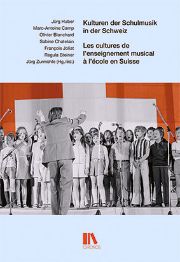Music as a subject in Switzerland
Music as a school subject varies from region to region. What developments has it undergone in recent decades and where is it heading?

This book has two titles, and that is programmatic. Thanks to its bilingualism, different perspectives on cultural issues and realities come together - entirely in the spirit and tradition of the SMZ. Co-authors Sabine Chatelain and Gabriele Noppeney even write their contribution to the book in two languages. They present two different teaching sequences (language acquisition through song lyrics and bilingual music lessons) which, although based on a common reference model (Integrated Music Education), were each carried out at a French-speaking and a German-speaking teacher training institution.
Each of the ten articles is preceded by a trilingual résumé / summary / abstract, which is particularly helpful when reading foreign-language texts.
In "Le role de la recherche dans le développement de l'éducation musicale scolaire", Madeleine Zulauf looks back on the forty-year history of music education in French-speaking Switzerland and notes that the interest of researchers is increasingly being reoriented and aimed at innovations in practice: "La posture des chercheurs passant de rétroactive à proactive." In contrast to French-speaking Switzerland, German-speaking Switzerland lacks a scientific tradition in music education. Here, school music is primarily seen as a practical discipline that is led by practitioners. But what conceptual ideas underlie this? Olivier Blanchard explores this question in his article "Swiss school music. School or music?". Here performance orientation, there music-making, which gives greater weight to emotional and community-building aspects than measurable performance.
Jürg Huber asks fundamental questions: What actually is the meaning, purpose, content and didactics of school music, and how is it discussed? While in the 1970s the focus was on "singing" and "critical listening education", today there is a more comprehensive understanding of music lessons, as a look at Curriculum 21 or current teaching materials shows. But what is our subject actually called, "singing" or "music"? The school subject was renamed throughout German-speaking Switzerland in 2000. But the question of how to prioritize singing still seems to be virulent, says Christoph Marty: Should singing continue to play the central role in music lessons or should it simply be one of various equally important lesson contents? Three of the ten articles in this book also deal with the position of singing or song in music lessons: "Singing or music. Reasons for changing a subject name" (Marty), "Teaching children's songs at school as a cultural component and core task of music didactics" (Stadler Elmer) and "Choral work as a contribution to artistic education at upper secondary level" (Beat Hofstetter).
A study by the Lucerne University of Applied Sciences and Arts confirms the popularity of singing at grammar schools. Music theory and music history, on the other hand, fared very poorly in the pupils' ranking. However, "listening to music" is even more popular than "singing / making music". What do these results mean for teaching? One obvious consequence would be: making music instead of studying music! Dieter Ringli proposes a different approach based on the primacy of action and student orientation: "Use the joy of singing and combine it with music theory!" How does that work? The pupils (SuS) work on a pop song: creating their own arrangement, making rhythms (body)percussively groove, finding vocal lines, harmonizing accompaniments, writing lyrics - the attempts to solve practical, technical problems lead intrinsically, as it were, to music theory, which is now practically useful. The study also shows that self-directed work in small groups is very motivating for the pupils.
What consequences do these research findings have for the role and tasks of music teachers? And what do they mean for their training? Jürg Zurmühle outlines a "framework model for teaching concepts for music lessons in kindergarten and elementary school", which opens up productive areas of tension between openness and structure, process and product orientation as well as constructivist and receptive learning. By balancing antinomic needs, the model offers guidance for the planning and implementation of music lessons and allows the setting of very different priorities in the school triangle of music, teaching and learning.
The book concludes with a look beyond our bilingual horizons, because: Music is global, but music cultures are local. And music education? In her contribution, Alexandra Kertz-Welzel says that it is precisely in the "context of the internationalization and globalization of music education teaching and academic cultures" that culturally sensitive music education that takes into account the different traditions is needed. Music education concepts such as the Orff-Schulwerk or the methods of Suzuki and Dalcroze are known around the world. However, more recent approaches come mainly from the Anglo-American world. Kertz-Welzel, who herself spent many years researching in the USA, asks whether we have to accept this dominance in music education research. No, because although music education is a global subject area and English is the lingua franca, the basic principle of "transnational exchange" is diversity. At this point, it is helpful to refer to https://www.isme.orgthe International Society for Music Education. The following should also be added https://eas-music.orgthe European Association of Music in Schools, which organizes exciting annual meetings and invites people to exchange ideas.
Cultures of school music in Switzerland features ten committed and profoundly researched contributions - and encourages reflection in many directions. Belongs in every school music room.
Kulturen der Schulmusik in der Schweiz - Les cultures de l'enseignement musical à l'école en Suisse, ed. Jürg Huber, Marc-Antoine Camp, Olivier Blanchard, Sabine Chatelain, François Joliat, Regula Steiner, Jürg Zurmühle, 200 p., Fr. 38.00, Chronos, Zurich 2021, ISBN 978-3-0340-1627-8









